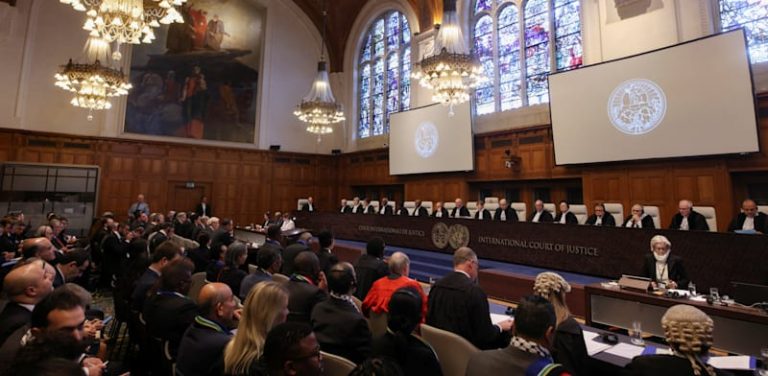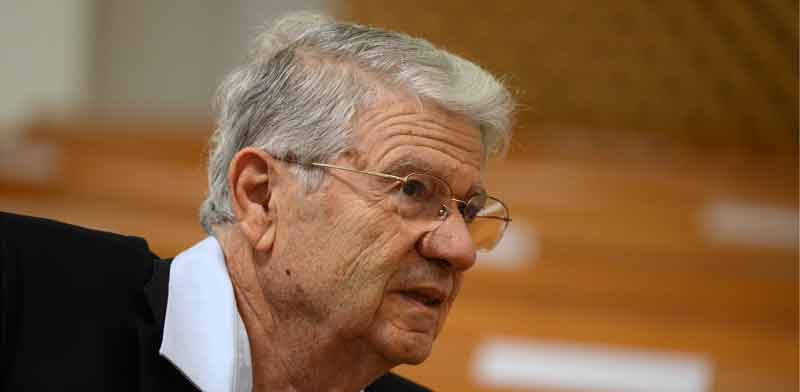After Israel presents its arguments to the International Court of Justice (ICJ) tomorrow afternoon against South Africa’s allegations, the 17 judges, including former Israeli Supreme Court President Aharon Barak, will decide whether ‘they must issue a temporary injunction. At this point, the court will not rule on whether Israel committed genocide and war crimes, as alleged. These charges will be investigated in detail and it could be years before a decision is made.
Here are the options available to the ICJ at this stage:
The first option is for the application to be dismissed and no injunction to be issued. This outcome is considered unlikely. The next option is the issuance of a general injunction ordering that these offenses must not be committed. Av. Roy Schondorf, former deputy legal adviser to the Israeli government on international law and currently responsible for international dispute resolution at the law firm Herzog Fox & Neeman, explains: “It would be an empty order. An order which is declaratory but does not say much. For example, ordering the State of Israel to act in accordance with the laws of war or not to violate the Genocide Convention.
Another possibility would be for the ICJ to intervene in the area of humanitarian supplies and order Israel to guarantee humanitarian aid. Additionally, it is possible that the court will rule that statements made by Israeli officials must be investigated. Israel is expected to obey such an order. This week, the Israeli government’s attorney general issued an unusual opinion that « statements calling for, among other things, intentional harm to innocent civilians are contrary to current policy and could constitute criminal offenses, including incentive « . Several files are currently being examined by law enforcement. The message is, according to the assessment, intended to dissuade senior officials from speaking generally about the people of Gaza.
In the most extreme case, there is the possibility that the ICJ will issue an order to stop the Israeli military operation in the Gaza Strip.
Would Israel comply with an ICJ order?
The ICJ does not have the power to enforce its rulings, but it is possible for countries to turn to the UN Security Council to seek enforcement of any ruling. “Israel is not expected to obey an order, even if international law requires it to do so,” said Adv. Schöndorf said. “But countries can turn to the Security Council and demand that action be taken to compel Israel. The United States can use its veto, but it is not easy to veto a court order. The United States could impose demands on Israel regarding the fighting. » Av. Schondorf adds that such a situation would snowball on the international scene and could influence countries on whether to sell military equipment to Israel.
RELATED ARTICLES
Professor Amichai Cohen, an international law expert and external advisor to law firm Barnea Jaffa Lande, says this is an unlikely outcome. But if that were to happen, he believes Israel would not end the fighting. « In the only case where such an order was issued, in Ukraine v. Russia, the order was issued because Ukraine told the ICJ that it would end hostilities as soon as Russia did so. . It goes without saying that no such statement exists here. »
He also said that issuing a ceasefire order could cause problems in relations with Israel’s allies. “Western European countries are unlikely to continue selling weapons to Israel in order to continue the war that the court ordered to stop.”
Since 2001, the ICJ has issued temporary injunctions in 15 different cases. In seven of the 15 cases, the country against which the injunction was issued did not obey the order, » explains Professor Cohen. But he points out that five of these seven cases concerned Russia or the United States, against whom the court has no real capacity to enforce an injunction.
Published by Globes, Israel Business News – fr.globes.co.il – January 11, 2024.
© Copyright of Globes Publisher Itonut (1983) Ltd., 2024.




